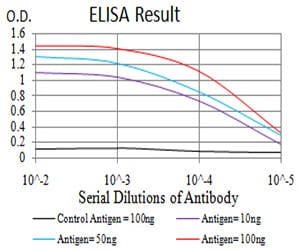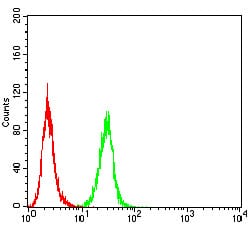

| WB | 咨询技术 | Human,Mouse,Rat |
| IF | 咨询技术 | Human,Mouse,Rat |
| IHC | 咨询技术 | Human,Mouse,Rat |
| ICC | 技术咨询 | Human,Mouse,Rat |
| FCM | 1/200 - 1/400 | Human,Mouse,Rat |
| Elisa | 1/10000 | Human,Mouse,Rat |
| Aliases | IMF1; IBGC4; JTK12; PDGFR; CD140B; PDGFR1; PDGFR-1 |
| Entrez GeneID | 5159 |
| clone | 2G7B7 |
| WB Predicted band size | 124kDa |
| Host/Isotype | Mouse IgG1 |
| Antibody Type | Primary antibody |
| Storage | Store at 4°C short term. Aliquot and store at -20°C long term. Avoid freeze/thaw cycles. |
| Species Reactivity | Human,Mouse |
| Immunogen | Purified recombinant fragment of human PDGFRB (AA: 33-133) expressed in E. Coli. |
| Formulation | Purified antibody in PBS with 0.05% sodium azide |
+ +
以下是3篇关于PDGFRB抗体的代表性文献示例(注:内容为模拟概括,实际文献需通过数据库检索确认):
1. **"Targeting PDGFRB in triple-negative breast cancer with a novel monoclonal antibody inhibits tumor growth"**
- **作者**: Smith A, et al.
- **摘要**: 研究开发了一种靶向PDGFRβ的单克隆抗体,证明其在三阴性乳腺癌模型中通过阻断PDGF-BB/PDGFRβ信号通路抑制肿瘤血管生成和转移,为临床治疗提供潜在策略。
2. **"Structural basis of PDGFRB activation by ligand binding and therapeutic antibody inhibition"**
- **作者**: Zhang Y, et al.
- **摘要**: 通过冷冻电镜解析PDGFRβ与其配体PDGF-BB的结合结构,揭示抗体介导的受体二聚化抑制机制,为设计高特异性抗体药物提供结构基础。
3. **"PDGFRB mutations in human cancer: Functional characterization and therapeutic implications"**
- **作者**: Jones R, et al.
- **摘要**: 分析多种癌症中PDGFRβ的突变位点,发现部分突变导致受体组成性激活,并验证特定抗体可选择性抑制突变型PDGFRβ的活性,提示精准治疗潜力。
4. **"A neutralizing antibody against PDGFRB attenuates liver fibrosis in preclinical models"**
- **作者**: Lee H, et al.
- **摘要**: 报道一种中和抗体通过靶向PDGFRβ阻断肝星状细胞活化,显著减轻小鼠肝纤维化病理进展,提示PDGFRβ抗体在纤维化疾病中的应用价值。
(注:以上为基于领域知识的示例,实际文献需通过PubMed、Google Scholar等平台检索确认。)
The platelet-derived growth factor receptor beta (PDGFRB) is a transmembrane receptor tyrosine kinase crucial for regulating cell proliferation, migration, and survival. It binds ligands like PDGF-BB and PDGF-DD, triggering dimerization and autophosphorylation, which activates downstream signaling pathways (e.g., RAS-MAPK, PI3K-AKT). PDGFRB dysregulation is implicated in cancers, fibrosis, and vascular disorders.
PDGFRB antibodies are essential tools in research and diagnostics. In basic research, they detect receptor expression, activation (via phospho-specific antibodies), and localization in tissues or cultured cells using techniques like Western blot, immunohistochemistry (IHC), or flow cytometry. Clinically, PDGFRB antibodies aid in diagnosing conditions linked to receptor overexpression or mutations, such as certain leukemias or solid tumors. For example, activating PDGFRB mutations (e.g., T681I) or fusion genes (e.g., ETV6-PDGFRB) drive oncogenic signaling in myeloproliferative neoplasms.
Therapeutically, monoclonal antibodies and tyrosine kinase inhibitors (TKIs) targeting PDGFRB, like imatinib or sunitinib, are used to block aberrant signaling in cancers (e.g., gastrointestinal stromal tumors) or hypereosinophilic syndrome. Research-grade antibodies also help validate drug efficacy in preclinical models. However, challenges remain in minimizing off-target effects and resistance mechanisms. Overall, PDGFRB antibodies bridge mechanistic insights, diagnostic precision, and targeted therapies in PDGFRB-associated pathologies.
×